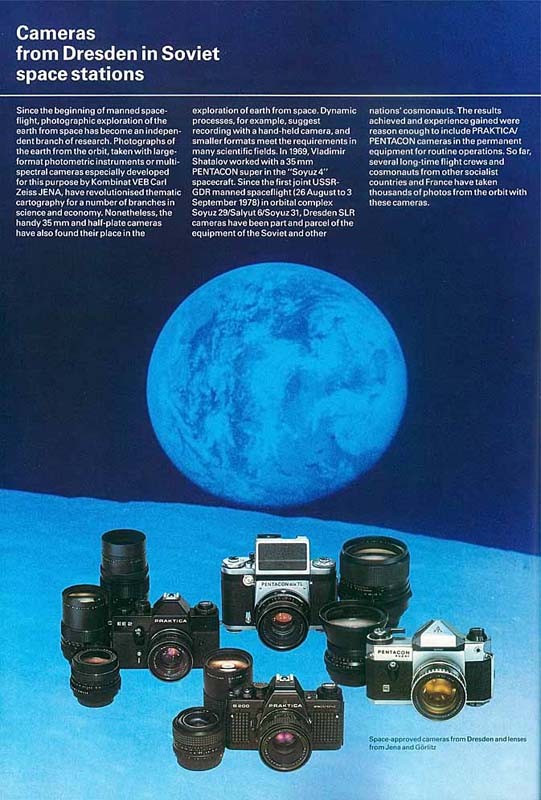| In 1968, a version of the Pentacon Six TL
that had been slightly modified by Zeiss (information from specialist collector
CB) was used in a joint USSR-GDR manned space mission (“Fifty Years”, p.
35), with its standard lens and the 50mm Flektogon and 180mm Sonnar.
It was given the name “Pentacon-Six m”. The report continues:
“Since then, Pentacon and Praktica cameras have been included in the permanent
equipment for Soviet space flights, and thousands of photos have been taken
from orbit with them, by cosmonauts from the Soviet Union, France and other
nations.”
In August 1978 a Pentacon Six TL was taken to the
Soviet space station Soyuz 6, and used to take pictures for the biosphere
experiment (Jehmlich, p. 188).
In the picture on the right, the Pentacon Six TL is seen
with the 50mm wide-angle Flektogon lens and the 180mm short telephoto Sonnar
lens.
The short-lived but top-specification 35mm Pentacon Super
camera can also be seen, with an f/1.4 Carl Zeiss Jena 55mm Pancolar lens.
The Pentacon Super was available from approximately 1968 until 1972 (Hummel,
p. 225). In January 1969 the Pentacon Super was the first Dresden
camera in space, where it was used in the space ship Soyus 4 (Hummel, p.224).
The Praktica EE2 was an auto-exposure 35mm camera with
an M42 lens mount, with electrical transfer of the lens aperture setting
to the built-in meter. It was produced between 1977 and 1979 (Hummel,
p. 265).
At the front of this composite image can be seen a Praktica
B200 35mm bayonet mount camera with two lens. It was manufactured
between 1979 and 1982 (Hummel, p. 278).
Unfortunately, as Jehmlich points out (p. 188), apart
from a few well-displayed images in Trade Fairs and exhibitions, there
was no systematic publication of such images, and no advertising campaigns
built on these exceptional uses of the equipment – undoubtedly a missed
advertising opportunity (in contrast to the massive publicity given to
Hasselblad in space and on the moon, and to images taken with it).
In fact, most Pentacon Six users probably never heard of its use in space
– not to mention a vast market that might have been persuaded to consider
a Pentacon Six as an alternative to a (hugely expensive) Hasselblad.
|
|

Picture from Photography: 150 Years, p. 32
To see a larger version, click on the image.
[spacecam_s.jpg]
|
